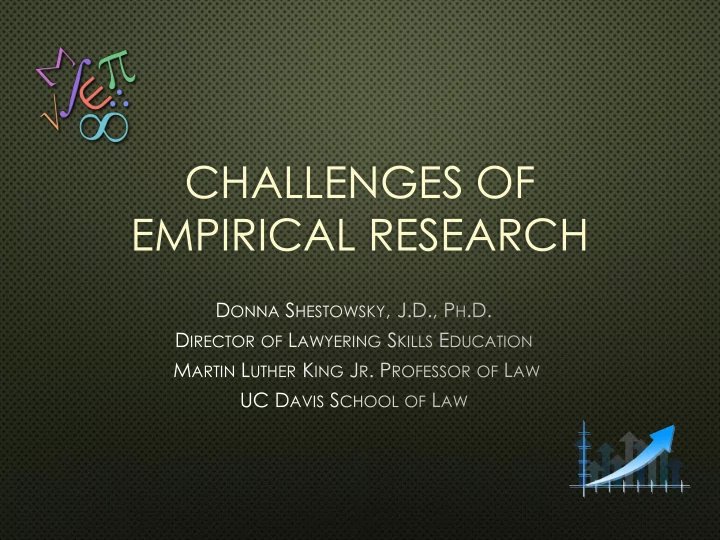

CHALLENGES OF EMPIRICAL RESEARCH
EMPIRICAL RESEARCH IS . . . H ELP WITH IDEAS AND FUNDING A PPROVAL FROM YOUR INSTITUTION R ESEARCH TEAM D ATA = N OT ALWAYS EASY TO GET PUBLISHED
WHERE DO I START?
FUNDING IDEAS • Internal campus opportunities • External relations • Professional organizations you belong to • AAA-ICDR Foundation www.aaaicdrfoundation.org/grants • Other Foundations https://inequality.cornell.edu/research/grant- opportunities-in-the-social-sciences/#foundations • National Science Foundation (NSF) www.nsf.gov/funding/ • Law & Social Sciences Program • Grants.gov Lists discretionary funding opportunities from many US government agencies, see https://www.grants.gov/ • Pivot Provides “access to the most comprehensive global source of funding opportunities —totaling billions of dollars and growing,” see: www.proquest.com/products-services/Pivot.html
DOES YOUR RESEARCH INVOLVE HUMAN SUBJECTS? From: https://www.hhs.gov/ohrp/regulations- and-policy/decision-charts/index.html#c1
IRB APPROVAL • Typical submission: consent form, detailed protocol, additional supporting documents (e.g., surveys, recruitment ads etc). • Locate forms and list of deadlines on your University’s Office of Research site. • If you collect data, you need human subjects certification (e.g., short online course). T HE ABOVE CAN TAKE SEVERAL MONTHS . . .
WRITING SURVEY QUESTIONS • Never do this alone! • Use vetted resources: • Examples: RSI/ABA Model forms; peer- reviewed articles • Get feedback, and then get feedback again • Conduct a pilot study or focus group
BUILDING A TEAM • Team leader/ PI • Academics from law or other fields • Students from law or other fields • Professionals from outside academia • Examples: court personnel, mediators, lawyers • Who else? What are your needs in: • Survey design, statistics, accounting, administrative tasks, IT, participant recruitment
RESEARCH TEAM – LITIGANT STUDY EXAMPLE 1. Colleagues and friends: study design; survey feedback; self-imposed peer review for articles 2. Faculty support/staff: copying; mailing; phone/email contact with participants; organizing returned consent forms and surveys 3. Law students: phone interviews 4. Undergraduates: data entry for written surveys 5. Accountants: payments to participants; budget management with funding sources 6. Psychology professors and grad students: statistical consulting and analyses; creating tables and graphs
THE FUTURE? • Universities/ Organizations : create funding opportunities; establish recognition awards • Courts, Lawyers, Neutrals: solicit collaborations; remove barriers • Professors: conduct outreach to grad students and junior faculty; encourage and offer to help your school’s journals re: reviewing empirical work
Recommend
More recommend